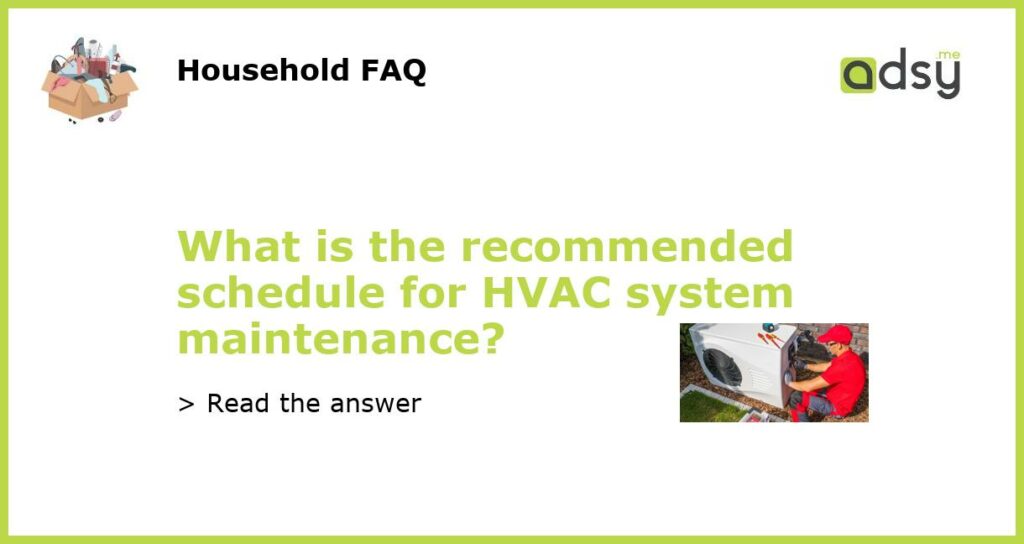Why Regular HVAC System Maintenance is Important
Regular maintenance of your HVAC (Heating, Ventilation, and Air Conditioning) system is crucial to ensure its efficient and reliable operation. Without proper maintenance, your HVAC system can become less efficient, leading to higher energy bills and potential breakdowns.
Moreover, regular maintenance helps improve indoor air quality by reducing dust, pollen, and other allergens circulating in your home. It also extends the lifespan of your HVAC system, saving you money on costly repairs or replacements in the long run.
So, what is the recommended schedule for HVAC system maintenance? Let’s dive into the details.
Annual Maintenance Service
At a minimum, your HVAC system should undergo professional maintenance once a year. Ideally, schedule this service in the spring or fall before the peak seasons of summer and winter, when you rely heavily on your system.
During the annual maintenance service, a qualified technician will perform a thorough inspection of your HVAC system. This includes cleaning the components, checking refrigerant levels, lubricating moving parts, testing controls, and ensuring proper airflow.
By addressing any issues during the annual maintenance service, you can prevent major breakdowns and keep your HVAC system running smoothly throughout the year.
Regular Filter Changes
In addition to annual professional maintenance, it’s important to regularly change your HVAC system’s filters. Clogged filters restrict airflow, reducing the efficiency of your system and potentially causing damage.
The frequency of filter changes depends on several factors, such as the type of filter, the number of occupants in your home, the presence of pets, and the local air quality. As a general rule, check your filters every month and replace them if they appear dirty or clogged.
Investing in high-quality filters can also improve indoor air quality by trapping more airborne particles. Look for filters with a MERV (Minimum Efficiency Reporting Value) rating between 8 and 11 for optimal performance.
Seasonal Maintenance Tasks
In addition to the annual maintenance service, there are specific tasks you should perform depending on the season:
Spring: Clean the outdoor condenser unit by removing any debris, such as leaves or grass. Trim vegetation around the unit to ensure proper airflow. Check the refrigerant levels and clean the evaporator coils.
Summer: Regularly clean or replace filters to keep the system running efficiently. Monitor the airflow and check for any unusual odors or noises.
Fall: Inspect the furnace or heat pump for any issues before the heating season begins. Check the ignition and burners, and clean the flame sensor.
Winter: Monitor the system for any potential problems, and schedule maintenance for early spring to ensure optimal performance during the cooling season.
Additional Considerations
Besides scheduled maintenance, there are a few additional considerations to keep in mind for optimal HVAC system performance:
Regular Cleaning: Keep the area around your HVAC system clean and free from debris to prevent airflow restrictions. Dust and vacuum the registers and vents regularly to improve indoor air quality.
Proper Thermostat Use: Use a programmable thermostat to regulate your home’s temperature more efficiently. Set it to lower or higher temperatures when you’re away from home to conserve energy.
Professional Inspections: If you notice any issues with your HVAC system, such as strange odors or unusual noises, schedule a professional inspection. Early detection and repair can prevent major problems down the line.
Energy Efficiency Upgrades: Consider upgrading to a more energy-efficient HVAC system if yours is nearing the end of its lifespan. Energy-efficient systems can save you money on energy bills and may qualify for rebates or incentives.
By following the recommended schedule for HVAC system maintenance and implementing these additional considerations, you can ensure your HVAC system operates efficiently, improves indoor air quality, and lasts for years to come.

